Best Digital Cameras of 2019
Introduction

In this feature article, Neocamera looks back the newest digital cameras to recognize models that are best-in-class with their image-quality, performance and capabilities. Digital Camera models are divided into 5 distinct categories:
- Travel-Zoom: These compact cameras offer a long zoom and high degree of controls in a highly portable size, making them well-suited for amateur travel photography and vacation pictures.
- Premium Compact: Also relatively compact, these digital cameras feature a large sensor paired with a fixed lens and efficient manual-controls. This allows them to deliver high image-quality with lower noise and superior dynamic-range compared to other fixed-lens cameras.
- Ultra-Zoom: Fixed lens digital cameras with very long zoom ranges. Those are larger than compact which allows them to pack up to 125X optical zoom or shorter ones with bright optics.
- Mirrorless: These are now the most common type of digital cameras featuring large sensors up to Medium Format and interchangeable lenses. Their lack of mirror makes it possible to capture top image-quality without the need for a mirror box which plus allows them to shoot completely silently.
- DSLR: Classic digital cameras with large sensors and optical reflex viewfinders. These are renowned for their top image-quality, durability and efficiency.
Many years ago, there was a separate category for Ultra-Compact digital cameras which could fit in a pocket. The days of these cameras are numbered with no such camera introduced in the last two years! Those have all been replaced by cellphones. The digital camera market as a whole suffered a significant decline when cellphone cameras became sufficiently good but it seems like it has resettled. While each year from 2010 to 2016 saw the introduction of between 60 and 145 digital cameras, only 34 and 35 digital cameras were introduced in 2017 and 2018, respectively. During 2019, just 40 new digital cameras were launched.
Given the sparsity of new cameras in most categories, this selection of Best Digital Cameras covers models introduced in 2018 and 2019. Otherwise there would be less than 5 cameras to choose from in 3 categories! DSLRs saw only 2 additions in 2019 while mirrorless accounted for more than half with 23 new models.
Travel-Zoom
All new digital cameras really need to deliver a clear advantage over cellphones to succeed in market. This is extremely easy for larger cameras yet no so much for compact ones. Travel Zooms have two distinct advantages. Their most definite one is a long optical zoom that reaches between 8X and 40X. The second is full manual controls. All but one Travel-Zoom since 2018 also feature an EVF which greatly helps with framing, particularly in bright light.
Travel-zoom are second in popularity only to Mirrorless Digital Cameras with 9 new models launched these past two years:
- Canon Powershot SX740 HS - 20 MP 1/2.3" sensor and 40X zoom but no EVF.
- Leica C-Lux - 20 MP 1" sensor and 15X zoom with 0.53X magnification 2.3 MP 0.2" EVF .
- Nikon Coolpix A1000 - 16 MP 1/2.3" sensor and 35X zoom with 1.2 MP 0.2" EVF showing 96% coverage.
- Panasonic Lumix ZS80 - 20 MP 1/2.3" sensor and 30X zoom with 0.53X magnification 2.4 MP 0.21" EVF .
- Panasonic Lumix ZS200 - 20 MP 1" sensor and 15X zoom with 0.53X magnification 2.3 MP 0.2" EVF.
- Sony Cybershot HX95 - 18 MP 1/2.3" sensor and 30X zoom with 0.5X magnification 640K 0.2" EVF.
- Sony Cybershot HX99 - 18 MP 1/2.3" sensor and 30X zoom with 0.5X magnification 640K 0.2" EVF.
- Sony Cybershot RX100 VI - 20 MP 1" sensor and 8.3X zoom with 0.59X magnification 2.4 MP 0.39" EVF.
- Sony Cybershot RX100 VII - 20 MP 1" sensor and 8.3X zoom with 0.59X magnification 2.4 MP 0.39" EVF.
At first glance, these basic specifications look quite similar and, in fact, they are. The Leica C-Lux and Panasonic Lumix ZS200 are the same camera manufactured by Panasonic with a different logo and higher price for the Leica version. The Sony Cybershot HX95 and HX99 are also nearly identical with the HX99 selling for $25 USD more due to its second control-dial and touchscreen functionality. Image-quality wise and optically, these are indistinguishable. Sony is adding one new RX100 edition per year which deliver incrementable improvements, with the VII being mostly faster and adding an audio input, compared to the VI.
Among all these digital cameras, 3 undeniably deliver superior image-quality thanks to their larger 1" sensor. While both the Sony RX100 VII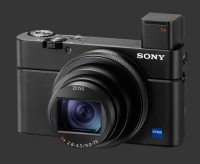
Sony Cybershot DSC-RX100 VII and RX100 VI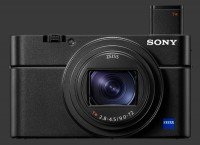
Sony Cybershot DSC-RX100 VI are excellent digital cameras, the digital camera that best delivers the Travel Zoom experience is the Panasonic Lumix DC-ZS200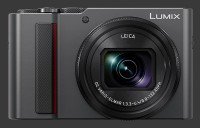
Panasonic Lumix DC-ZS200 thanks to its nearly twice as powerful zoom and extensive feature set.
Best Travel-Zoom 2019
Panasonic Lumix DC-ZS200

This Travel Zoom is incredibly compact for what it offers. Its 20 megapixels 1" CMOS sensor ensures high image-quality and best-in-class low-light capability. The sensor is mounted on a 5-axis image-stabilization system and paired with an ultra-wide 15X optical zoom lens, covering the equivalent 24-360mm range on a full-frame. This necesarily comes with a rather dim F/3.3-6.4 maximum aperture to keep the entire camera just 45mm thick. The state-of-the-art sensor-shift mechanism allows the ZS200 to automtically take level photos even if the camera is not kept perfectly straight.
The Panasonic Lumix DC-ZS200
Panasonic Lumix DC-ZS200 is extremely feature-rich. It offers full-manual controls, including Bulb exposure up to 2 mins, choice of metering patterns, 7-shot AEB and WB Fine-Tuning. There is also built-in HDR, Multiple-Exposure and an Interval Timer, functions which are rare among fixed lens cameras. Although it does not shoot as quickly as Sony RX100-series, the ZS200 still manages a fast 10 FPS drive and records 4K Ultra-HD video.
Framing is possible via a small 0.2" EVF with 2.3 megapixels which shows 100% coverage at 0.53X magnification. This is the only camera among its peers to feature an Eye-Start sensor. There is also a 3" Touchscreen LCD with 1.2 MP on the back. At just 340g, this camera is great for casual travel photography while taking almost no space.
Premium Compact
The Premium Compact category of digital cameras does not have such clear definition as other categories. Broadly, a Premium Compact is a compact camera designed for prosumers and professional photographers. These cameras need a relatively large sensor and bright lens with complete manual controls along with plenty of external controls to make their use efficient. From 2018 to 2019, only 3 such digital cameras were released:
- Canon Powershot G5X Mark II - 20 MP 1" CMOS sensor with 24-120mm F/1.8-2.8 lens
- Leica D-Lux 7 - 17 MP Four-Thirds CMOS sensor with 24-75mm F/1.7-2.8 lens
- Panasonic Lumix LX100 II - 17 MP Four-Thirds CMOS sensor with 24-75mm F/1.7-2.8 lens
It turns out the Leica D-Lux 7 and the Panasonic LX100 II are identical except for the logo and price. This gives an automatic win to the Panasonic Lumix DC-LX100 II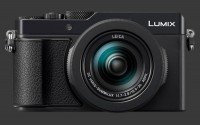
Panasonic Lumix DC-LX100 II given that it costs $300 USD less than the D-Lux 7, the same price as the G5X Mark II, except that image-quality of the LX100 II is superior due to its larger sensor and lower pixel count.
Best Premium Compact 2019
Panasonic Lumix DC-LX100 II

The Panasonic Lumix DC-LX100 II
Panasonic Lumix DC-LX100 II truly embodies its Premium Compact class. It is actually built around a 20 MP Four-Thirds CMOS sensor which is cleverly used to capture 17 MP images at 3:2, 4:3 and 16:9 aspect-ratio while maintaining a constant diagonal angle-of-view. This sensor is paired with an ultra-bright 24-70mm F/1.7-2.8 equivalent lens yet it can handle wider or taller subjects by switching aspect-ratio which can be done instantly using a mechanical slighter at the top of the lens barrel. The lens is fitted with optical image-stabilization.
This is a highly tactile digital camera that places many controls within easy and efficient reach. There is a direct Aperture Ring, a Shutter-Speed Dial, an Exposure-Compensation dial, a customizable smooth control-ring on the lens barrel and a control-dial on the rear. The dual control-dials and several buttons are customizable. The main concern noted in our in-depth Panasonic LX100 II review is that having so many cramped buttons with soft detents make this camera accident-prone and requires a bit more attention than usual.
Panasonic packed a huge number of features in the LX100 II. Its hybrid shutter covers a 1/16000s to 60s shutter-speed range and supports Bulb exposures up to 30 minutes. Continuous shooting full-resolution images is possible at 11 FPS using the mechanical shutter. The fast sensor can record 4K Ultra-HD video at 30 FPS or 1080p Full-HD video at 60 FPS. In addition to full manual-controls, this camera auoffers 7-frame AEB, HDR blending, an Interval Timer, Time-Lapse Video, Stop-Motion Animation, Multiple-Exposure and Motion Panorama.
A mid-size 0.38" EVF with a sharp 2.8 megapixels of resolution offers an exceptionally large 0.7X magnification. It shows 100% coverage and features an essential Eye-Start Sensor. The 3" Touchscreen LCD on the rear shows 1.2 MP. This camera has a standard hot-shoe and extensive connectivity features. The Panasonic LX100 II is an extremely well-round offering that really delivers a best-in-class combination of image-quality, controls and features.
Ultra-Zoom
Ultra-Zoom Digital Cameras take advantage of having small sensors to get an extreme telephoto angle-of-view at a fraction of the size required for the equivalent focal-length. Huge leaps in optic technology pushed the current crop of ultra-zoom to a new level. Originally, the term Ultra-Zoom applied to any camera with at least 10X optical zoom which is now available in Compact cameras which mostly fall under the Travel Zoom category. Large ultra-zooms now reach more than 10X further. The were 4 digital cameras falling into this category since 2018:
- Panasonic Lumix FZ1000 II - 20 MP 1" sensor with 16X optical zoom.
- Nikon Coolpix B600 - 16 MP 1/2.3" sensor with 60X optical zoom.
- Canon Powershot SX70 HS - 20 MP 1/2.3" sensor with 65X optical zoom.
- Nikon Coolpix P1000 - 16 MP 1/2.3" sensor with 125X optical zoom.
Certainly the best image quality by a significant margin among these new Ultra-Zoom cameras comes from the Panasonic Lumix FZ1000 II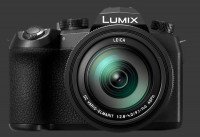
Panasonic Lumix FZ1000 II due to its 1" CMOS sensor. Its lens manages a relatively bright F/2.8 maximum aperture at the widest 25mm-equivalent focal-length and closes just one stop to F/4 at 400mm. When this focal-range is sufficient, the FZ1000 II is a fantastic choice that will show its superiority in low-light yet it does not provide much more than the Panasonic Lumix DC-ZS200
Panasonic Lumix DC-ZS200 awarded as Best Travel Zoom above.
Best Ultra-Zoom 2019
Canon Powershot SX70 HS
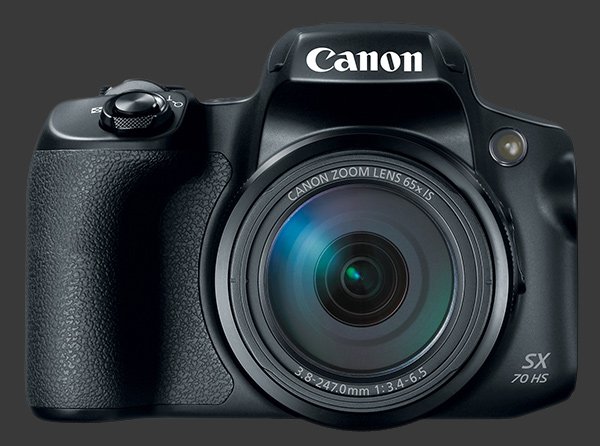
This prosumer Ultra Zoom uniquely starts at a wider focal-length than any other fixed lens digital camera. At its widest 21mm-equivalent focal-length the Canon SX70 HS captures a 90° angle-of-view compared to 84° for 24mm which is much more common. With a 65X optical zoom, this camera reaches an extreme 1365mm-equivalent focal-length. While can crop to get a smaller subject to fill the frame, widening is not possible without assembling multiple images. For this reason, the Canon Powershot SX70 HS
Canon Powershot SX70 HS is the Best Ultra-Zoom for 2019.
At its core, the SX70 HS features a typical tiny 20 MP sensor which limits image-quality in favor of an extremely long reach. The lens has a F/3.3 maximum aperture at the widest and closes down to a rather dim F/6.5 at the long end. This necessarily means that long shutter-speeds must be used to avoid increasing ISO where images from this camera gets very noisy. To compensate, Canon built a new optical image-stabilization system into this ultra-zoom which is rated at 5-stops of efficiency.
The remaining specifications of this digital camera are quite typical with an ultra-zoom. Although designed to look like a small DSLR, this camera is considerably smaller with limited number of controls and only a single control-dial. A welcome improvement over most ultra-zooms is that the Canon SX70 HS features 2.4 MP 0.39" EVF with 100% coverage. The HS designation on the SX70 means that Canon built this ultra-zoom for high-speed. At can shoot full-resolution images continuously at 10 FPS and record 4K Ultra-HD video at 30 FPS. Also unusual for this class of camera is that it includes a stereo audio input.
Overall, the Canon Powershot SX70 HS is an ultra-zoom for people that do not mind image-quality yet want great versatility for framing and a moderately compact size. The ace in the sleeve of this ultra-zoom is its lens which not only is wider than any other fixed to a digital camera but can also focus right onto the lens surface for extreme macro photography at 0cm.
Mirrorless
Mirrorless Digital Cameras are the only growing market segment in the industry. In fact, 2019 has seen more new Mirrorless cameras than any other year with 23 models launched. Only 2013 had a comparable number with the introduction of 20 such cameras. This is expected given that mirrorless digital cameras combine high-image quality, often using the same sensors used by DSLRs, and unprecedented speed in a comparatively small form-factor.
New Mirrorless Cameras span all levels of photographers from casual ones to professionals. With prices between a few hundred dollars to several thousands, this makes recognizing a single best mirrorless pointless. Therefore, the most capable mirrorless will be rewarding in each of the following categories:
- Beginner: Cameras that produce good quality images with minimal effort in the most compact size possible.
- Advanced: Digital cameras delivering good image quality with more control in a very compact size.
- Prosumer: Mirrorless cameras that output high quality images with efficient controls in a compact form-factor.
- Professional Travel Photographer: Mirrorless cameras that maximize image-quality relative to their size while providing efficient ergonomics and the ability to handle any environment.
- Professional Onsite Photographer: The absolute top image quality possible for any type of photography where size is no object, wether onsite for architecture or urban photography or in a studio.
- Professional Action Photographer: Cameras that excel at capturing fast action with the best image quality.
Best Beginner Mirrorless 2019
Panasonic Lumix DC-GX9
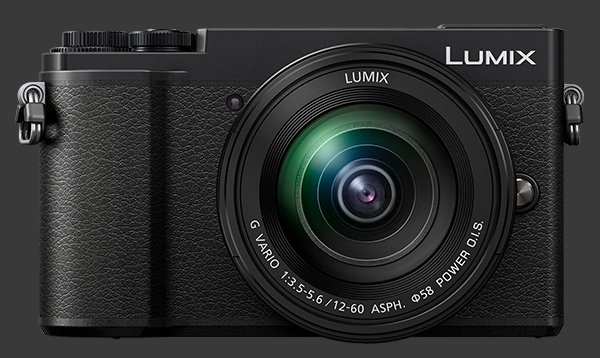
While everyone wants high image-quality, beginners are highly concerned by the total size of their gear which is the primary reason for many buying DSLRs only to leave it at home most of the time. Without a doubt, Micro Four-Thirds is designed to solve this issue and, although there are APS-C mirrorless cameras of similar size, they require larger and heavier lenses.
The Panasonic Lumix DC-GX9
Panasonic Lumix DC-GX9 packs a 20 megapixels Four-Thirds CMOS sensor mounted on a 5-axis image-stabilization system that delivers a 4-stop advantage over hand-holding. It is the smallest and second lightest mirrorless to include an EVF since 2018. Although beginners do not always use a viewfinder, having one is essential to frame in bright light while adding stability and making it easier to keep the camera level. This camera can produce high-quality images down to relatively low light thanks to its built-in image-stabilization.
Although very compact, the GX9 offers an impressive feature-set. This includes full manual-controls with an ultra-fast 1/16000s maximum shutter-speed to freeze action and Bulb exposures of up to 30 minutes to capture light trails. Its fast processor can sustain 9 FPS at full-resolution and record 4K Ultra-HD video at 30 FPS. This mirrorless supports 7-shot Auto Exposure Bracketing, built-in HDR, an Interval-Timer, Time-Lapse video and Multiple Exposure.
The rectangular body of this mirrorless includes a tiltable 0.39" EVF with a sharp 2.8 megapixels, a good 0.7X magnification, 100% coverage and an essential Eye-Start Sensor. There is also a 3" Touchscreen LCD with 1.2 MP on the back. Beginners keen on sharing images quickly will appreciate its WiFi and Bluetooth 4.2 LE connectivity. Paired with a correspondingly compact Micro Four-Thirds lens, the Panasonic Lumix GX9 is truly delivers image-quality that exceeds its size.
Best Advanced Mirrorless 2019
Olympus OM-D E-M5 Mark III
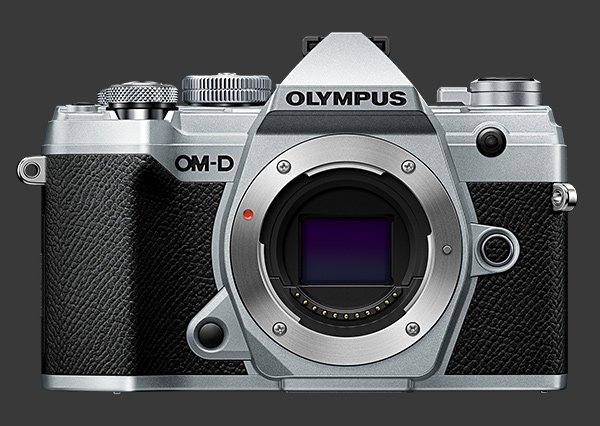
People buying a digital camera are often interested in having advanced features to push their creativity. Even though Olympus launched their OM-D series as a premium range of mirrorless, they managed to squeeze an incredible number of features in the extremely compact Olympus OM-D E-M5 Mark III
Olympus OM-D E-M5 Mark III. This is the lightest mirrorless of 2018-2019 while being weatherproof and freezeproof to -10C.
The E-M5 Mark III truly punches above its weight. Based around a 20 megapixels Four-Thirds CMOS sensor with a built-in 121-Point Phase-Detect AF system, this mirrorless includes a state-of-the-art 5-axis sensor-shift mechanism with 5½-stops efficiency, Its hybrid shutter covers a 1/8000-60s range while allowing Bulb exposures of up to 3 hours which are helped by Live-Bulb and Live-Time modes that show an exposure as it develops. Continuous shooting at 10 FPS is possible at full-resolution, plus Cinema 4K video at 24 FPS.
This digital camera packs dual control-dials, a traditional mode-dial and a viewfinder in a tiny body. The 0.39" EVF has a respectable 2.4 MP of resolution and nice 0.68X magnification while showing 100% coverage and having an Eye-Start Sensor. The number of features in this tiny camera body necessarily comes at the cost of high complexity, particularly when dealing with the menu system and various control-panels. With the Olympus OM-D E-M5 Mark III, amateur photographers actively using this camera are bound to learn it and will surely produce great images.
Best Prosumer Mirrorless 2019
Fujifilm X-T30
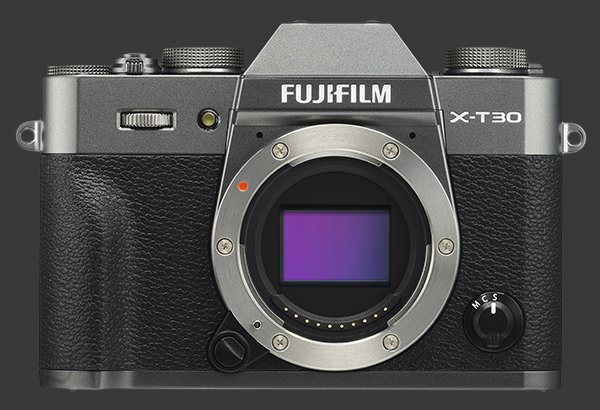
The Fujifilm X-T30
Fujifilm X-T30 is a technological wonder. This highly compact mirrorless features a 26 megapixels 4th-Generation X-Trans APS-C CMOS sensor with 2.1 million Phase-Detection pixels! This sensor has nearly twice the surface area of a Four-Thirds one and still manages to fit in a similarly-sized body. The trick to pull this off is that the X-T30 smaller optics for its EVF and excludes image-stabilization, instead relying on the less effective systems built into specific lenses.
Given its relatively large APS-C sensor with unique X-Trans Color-Filter-Array to omit the need for an Anti-Alias Filter, the Fujifilm X-T30 produces very high-quality images with excellent rendition of details and quite low image-noise, although falling slightly short of class-leading due it a high pixel-density. Dynamic-range though is vastly superior to what Micro Four-Thirds cameras can capture. Of course, this sensor requires lenses with APS-C coverage which are considerably larger and heavier than equivalent Micro Four-Thirds ones. There is no free lunch as they say.
Fujifilm made their 4th-Generation sensor extremely fast. Its hybrid 425-Point AF system combines both Phase-Detect and Contrast-Detect to lock focus at blazing speed while the hybrid shutter allows for 20 FPS continuous shooting at full-resolution or 30 FPS with a 16 MP 1.25X crop. In this mode, shooting is black-out free and the viewfinder optionally shows 125% coverage to frame fast-moving subjects.
This mirrorless has a highly mechanical interface which makes it particularly efficient to use thanks to dual control-dials plus an aperture-ring on most compatible Fujinon lenses. There are direct dials for Shutter-Speed, Exposure-Compensation and Drive Modes too, plus an 8-way joystick. Its feature-set is comprehensive while not including so many functions to make it complex. Still, this camera supports 9-frame AEB, Focus-Bracketing, Motion Panorama, an Interval Timer and Multiple-Exposure.
All this counts to make the Fujifilm X-T30 the Best Prosumer Mirrorless of 2019. Its combination of high image-quality and speed is unmatched by a digital camera this compact.
Best Travel Photography Mirrorless
Sony Alpha A6600
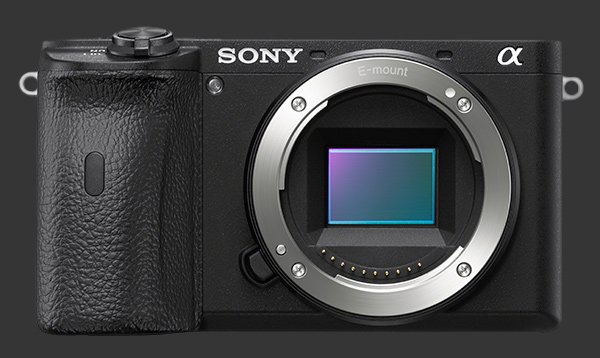
Sony are undeniably the masters of miniaturization and the clearly demonstrate it with the Sony Alpha A6600
Sony Alpha A6600 This compact mirrorless is built around a 24 megapixels APS-C CMOS sensor with 425-Point Phase-Detect AF built-in and it manages to incorporate a 5-axis image-stabilization system while being roughly the same size as the Fujifilm X-T30 above. This makes it superior for low-light photography but what makes it even more suitable for Travel Photography is its weatherproof construction. As a bonis, it manages a battery-life of 720 shots-per-charge, almost double what the X-T30 is can do.
Image quality of the Sony A6600 is excellent with very low image-noise and above 13½-stops of dynamic-range. This gives it best-in-class image-quality among APS-C mirrorless cameras, falling slightly below the very best APS-C DSLRs which can manage to capture an extra stop of dynamic-range. Using its sensor-shift mechanism with 5-stops of efficiency though, this mirrorless is more capable than those DSLRs under most conditions.
While not so feature-rich, the A6600 provides all essential photographic functions, including 5 metering patterns, 9-frame AEB, WB Fine-tuning and an Interval Timer. Notably absent are built-in HDR, Time Lapse Video and Focus Bracketing. While these can be performed by computer, Focus Bracketing cannot be done repeatedly without the camera offering it. This camera offers fast 11 FPS continuous drive and 4K Ultra-HD video at 30 FPS.
The best ergonomic feature of the Sony A6600 is its large high-resolution 2.4 MP 0.5" EVF which shows 100% coverage at 0.7X magnification and has an Eye-Start Sensor. While this camera offers dual control-dials, the rear one is poorly placed. The Sony menu system is convoluted and together with limited external controls makes the A6600 somewhat inefficient to use. Despite these usability issues, the Sony Alpha A6600 offers fantastic image-quality in an exceptionally compact form-factor given that it includes 5-axis image-stabilization and a large EVF in a weatherproof body.
Best Onsite Photography Mirrorless
Fujifilm GFX 100
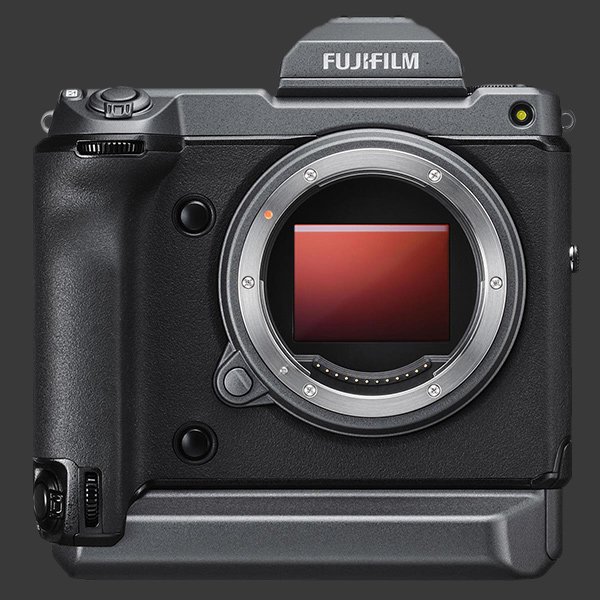
The Fujifilm GFX 100
Fujifilm GFX 100 truly the most superlative digital camera yet. Its predecessor, the GFX-50R reviewed here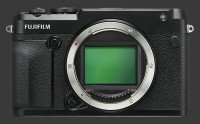
Fujifilm GFX 50R already produced the best image-quality of all and Fujifilm impressively doubled resolution to an unprecedented 102 megapixels while adding state-of-the-art 5-axis image-stabilization system with 5½-stops efficiency! These 102 MP Medium-Format sensor in the GFX-100 is capable of capturing 16-stops of dynamic-range which makes its images extremely detailed spatially and tonally.
When it comes to image-quality, nothing comes close to the GFX 100. Crucially, Fujifilm designed all their G-mount lenses to resolve 100 MP of details to transmit the maximum amount of details that can be captured by its Medium Format sensors. The ultra-high resolution sensor in this mirrorless includes a hybrid autofocus system that combines 3.8 million Phase-Detection pixels with Contrast-Detection info to create a virtual 425-Point AF system. This sensor can capture 100 MP images at 5 FPS and record Cinema 4K video. There is a hybrid shutter that covers shutter-speeds of 1/16000 to 1 hour exposures, either timed or in Bulb mode.
This mirrorless features a highest-resolution EVF on the market, a 0.5" EVF with 5.8 MP that gives an extremely large 0.86X magnification to its 100% coverage view. It is paired with an Eye-Start Sensor and there is also a 3.2" LCD with 2.4 MP on the back plus two status LCDs. The GFX 100 is positively enormous with dual grips, each having dual control-dials and an 8-way joystick, in a tough weatherproof and freezeproof construction. The camera body alone weighs 1.4kg and needs a lens which can easily add another 1kg.
For the utmost image quality, the Fujifilm GFX 100 clearly delivers. This clearly comes at a high cost for this unique digital camera. Given its weight, this GFX 100 is destined to be mostly used on a tripod, even though its dual-grips make it possible to hand-hold, yet not over long periods.
Best Action Photography Mirrorless
Sony Alpha A9 II
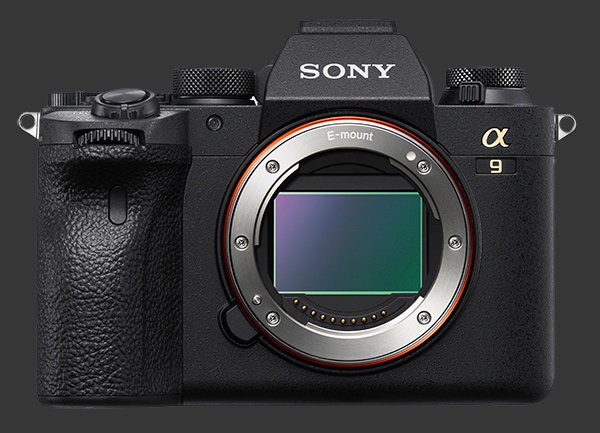
Mirrorless cameras started by adopting large sensors to match the image-quality of DSLRs yet mostly trailed behind in two areas: speed and viewfinder. While these gaps were diminishing, Sony tackled both with the launch of their original high-speed A9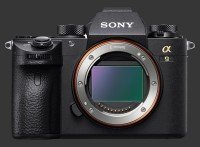
Sony Alpha A9 which showed the first blackout-free EVF and fast 20 FPS continuous shooting in a Full-Frame camera.
The Sony Alpha A9 II
Sony Alpha A9 II extends this just a little further. Using the same ultra-high speed 24 megapixels Full-Frame CMOS sensor with 693-Point Phase-Detect AF built-in, this new version can also capture full-resolution images at 20 FPS for up to 361 JPEG images or 239 RAW files. This is faster and longer than any DSLR. Having large pixels allows the A9 II to be extremely sensitive to light and offer a ISO 50-2,048,00 sensitivity range. Image quality from this mirrorless is superp, particularly in low-light where it can take advantage of an improved 5-axis image-stabilization system which is effective to 5½-stops over hand-holding.
With a 3.6 MP 0.5" EVF showing 100% coverage at 0.78X magnification, the Sony A9 II offers an expansive view of incredible precision. This high-contrast EVF is truly life-like and much more capable than an OVF with its numerous overlay, excellent Exposure-Priority preview and HUD. When using the electronic shutter, continuous shooting through this EVF is completely blackout-free, allowing for an unprecedented ability to track fast-moving subjects.
Based on a similar design to their other Full-Frame mirrorless digital cameras, the Sony A9 II features triple control-dials, a traditional mode-dial, an Exposure-Compensation dial plus a Drive Mode dial, not present on the A7 series. Controls are highly customizable to tune the behavior. Overall, this mirrorless is quite efficient with good ergonomics. As a professional model, the A9 II is weatherproof and includes Dual SDXC UHS-II memory-card slots. All this makes the Sony Alpha A9 II one of the best digital cameras for action photography.
DSLR
DSLRs remain the workhorse of professional photographers. These digital cameras output top-notch image quality, autofocus extremely quickly, last incredibly long and are compatible with thousands of lenses. The evolution of DSLRs, constrained by their mirror, prism and optical viewfinder, has been incremental. Only 2 new DSLRs were introduced in 2019, with 4 models added in 2018 and one more introduced which has yet to ship. Although mirrorless digital cameras can deliver the same image-quality and much faster speed, a DSLR outlasts any mirrorless when it comes to battery-life, very long exposures and access to specialty lenses.
The 6 new DSLRs that shipped in 2018 and 2019 are:
- Canon EOS 90D - Professional 32 MP APS-C 100% Coverage Weatherproof DSLR
- Canon EOS Rebel SL3 - Entry 24 MP APS-C 95% Coverage DSLR
- Nikon D3500 - Entry 24 MP APS-C 95% Coverage DSLR
- Canon EOS 4000D - Entry 18 MP APS-C 95% Coverage DSLR - Europe Only
- Canon EOS Rebel T7 - Entry 24 MP APS-C 95% Coverage DSLR
- Pentax K-1 Mark II - Professional 36 MP Full-Frame 100% Coverage Weatherproof & Freezeproof DSLR.
Surprisingly 4 out of 6 models are entry-level ones with a single control-dial and cropped viewfinder, even though those who really favor DSLRs are professionals. An incomplete viewfinder preview puts those entry-level units at a serious disadvantage against nearly every mirrorless digital camera. This leaves only 2 models to choose from, the Canon EOS 90D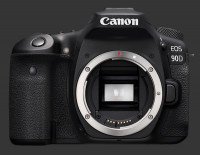
Canon EOS 90D and Pentax K-1 Mark II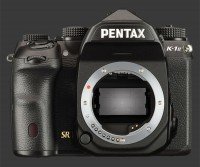
Pentax K-1 Mark II which makes the Best DSLR of these two years completely obvious.
Best DSLR 2019
Pentax K-1 Mark II

The Pentax K-1 Mark II is one of the best DSLRs on the market and the most feature-rich ever created. This Professional DSLR is built around a 36 MP Full-Frame CMOS sensor mounted on a state-of-the-art 5-axis image-stabilization system which is effective to 5-stops over hand-holding. No other current Full-Frame DSLR offers this. Plus, the K-1 Mark II derives many unique features from its sensor-shift mechanism: Automatic Leveling, Anti-Alias Filter Simulation, Handheld Super-Resolution and Astro-Tracking which is assisted by a built-in GPS and Digital Compass. This Astro-Tracer function allows the K-1 Mark II to compensate for the rotation of the Earth during astro-photography to eliminate star-trails.
With a 36 MP Full-Frame sensor, this DSLR produces high-resolution images with spectacular image-quality. By not pushing the resolution to the extreme, the K-1 Mark II maintains very low image-noise and captures over 14½-stops of dynamic-range. The sensitivity range of this camera covers ISO 100 to a stellar 8,192,000. Combined with its 5-axis image-stabilization that works for any lens, this camera is the best at low-light photography. Pentax emphasized this by placing LED illumination around the camera body to ease operation in complete darkness. There is also a nacklit Status LCD and Night Mode for the rear 3.2" LCD.
For all it's features, there are two aspects of the K-1 Mark II that are limited relative to other professional offerings. The first is a 33-Point Phase-Detect AF system which is very sensitive yet offers only 25 Cross-Type Points. The second is a maximum 4.4 FPS continuous shooting which is relatively slow. This is not the right DSLR for action photography but the fastest speeds are now offered by mirrorless cameras.
Although the Pentax K-1 Mark II weighs in at a full kilogram, it offers the best ergonomics and most efficient controls of any camera. The K-1 Mark II, its predecessor the K-1 and their APS-C cousin the K-P are the only DSLRs with triple control-dials. Its large and bright OVF shows 100% covarage at 0.7X magnification and the rear LCD has a unique 4-way tilting mechanism that is extremely solid. The camera is built like a tank with a best-in-class weatherproof construction which is also freezeproof to -10C. Dual SDXC memory-card slots round off professional features of the Pentax K-1 Mark II
Pentax K-1 Mark II.
Please Support Neocamera
All information on Neocamera is provided free of charge yet running this website is a huge endeavor. Purchases made via affiliate links found throughout the site help keep it running and up-to-date. There is no additional cost to you, so please consider buying via these links to our affilates:
If you found any information on this site valuable and did not purchase via our affiliate links, please considering donating via PayPal:
Any amount will be greatly appreaciated. Thank you for your support!
Updates
2025.01.18

Fujifilm GFX 2025 Lens Roundup
Lens Review roundup of Fujifilm GFX Medium-Format lenses. Quality, performance and handling of the GF20-35mm F/4R WR, GF30mm F/3.5 Tilt-Shift and the GF55mm F/1.7.
2024.11.18

Best 2024 Photography Gifts for Every Budget
Great gifts for photographers and photo enthusiasts selected for every budget among the best products of 2024.
2024.08.07

Eye Protection Tips for Professional Photographers
The four main considerations for professional photographers regarding eyewear.
2024.07.14

Fujifilm X100VI Review
Flagship fixed-lens compact digital camera with a 40 MP sensor and Image-Stabilization, a first for the series. Retro design featuring dual control-dials, plus direct ISO, Shutter-Speed and EC dials. Its hybrid viewfinder can switch between EVF and OVF mode.
2024.05.09

Fujifilm GFX100 II Review
Flagship 102 Megapixels Medium-Format Mirrorless Digital Camera with 8-Stop 5-Axis IBIS, 8 FPS Drive, 8K Video and 400 MP Super-Resolution capture in a weatherproof and freezeproof body with dual control-dials and dual memory-card slots.
2024.04.03

Fujifilm X-T5 Review
Newest Fujifilm flagship boasting a 40 MP APS-C sensor, 5-axis IBIS with 7-stop efficiency, 15 FPS continuous drive, 6.2K Video capture, dual control-dials and dual SDXC UHS-II slots in a sturdy weatherproof and freezeproof body.
2023.11.20

Best Digital Cameras of 2023
Find out which are the Best Digital Cameras of 2023. All the new Mirrorless Digital Cameras from entry-level to high-end professional.
2023.07.10

Fujifilm X-H2 Review
40 Megapixels APS-C Hybrid Mirrorless Digital Camera with 7-stop IBIS. Fastest shutter ever and 8K video capture. Large builtin EVF with 0.8X magnification and 5.8 MP, plus an Eye-Start Sensor. Packed with features and large number of controls in a weatherproof and freezeproof body.
2023.05.07

Sony FE 20-70mm F/4G Review
Review of the unique Sony FE 20-70mm F/4G lens. The optical zoom of this lens spans ultra-wide-angle and medium focal-length coverage, making it one of the most versatile Full-Frame lenses on the market.
2023.01.15

Huion Inspiroy Dial 2 Review
Review of the Huion Inspiroy Dial 2 tablet, a medium sized drawing surface with dual dials and customizable buttons. Connects via USB-C or Bluetooth 5.0 with Windows, Linux and Android support.
2022.12.08

How to Pack for a Photo Trip
Find out how to pack for a travel photography trip, carry your gear safely while meeting airline regulations.
2022.11.13

Best Digital Cameras of 2022
The best digital cameras of 2022. A short list of the most outstanding models in their respective categories. Choose one for yourself or as a gift.
2025.01.18
2024.11.18
2024.08.07
2024.07.14
2024.05.09
2024.04.03
2023.11.20
2023.07.10
2023.05.07
2023.01.15
2022.12.08
2022.11.13
NEWS
2025.04.22

Sony Unveils Brightest Full-Frame Telephoto Zoom Lens
Lens
2025.04.03

Nikon Released Second Generation Z5 Full-Frame Mirrorless
Digital Camera
2025.03.26

Canon Launches Pair of Cameras and Lenses
Digital Camera ○ Lens
2025.03.25

Venus Optics Launches Vista Vision Cine Lenses
Lens
2025.03.24

Think Tank Photo Walker Pro
Bag
2025.03.20

Fujifilm First Fixed Lens Medium-Format Camera
Digital Camera
2025.02.26

Sony Launches Two New Lenses at CP+2025
Lens
2025.02.25

CP+2025 Showcases Numerous Launches
Digital Camera ○ Lens
2025.02.13

Nikon Launches 5X Full-Frame Power-Zoom Lens
Lens
2025.02.05

Nikon Refreshes Flagship Ultra-Zoom
Digital Camera
2025.02.05

Nikon Launches Ultra-Bright 35mm F/1.2 Prime Lens
Lens
2025.01.21

Fujifilm Evolves INSTAX Wide
Digital Camera









